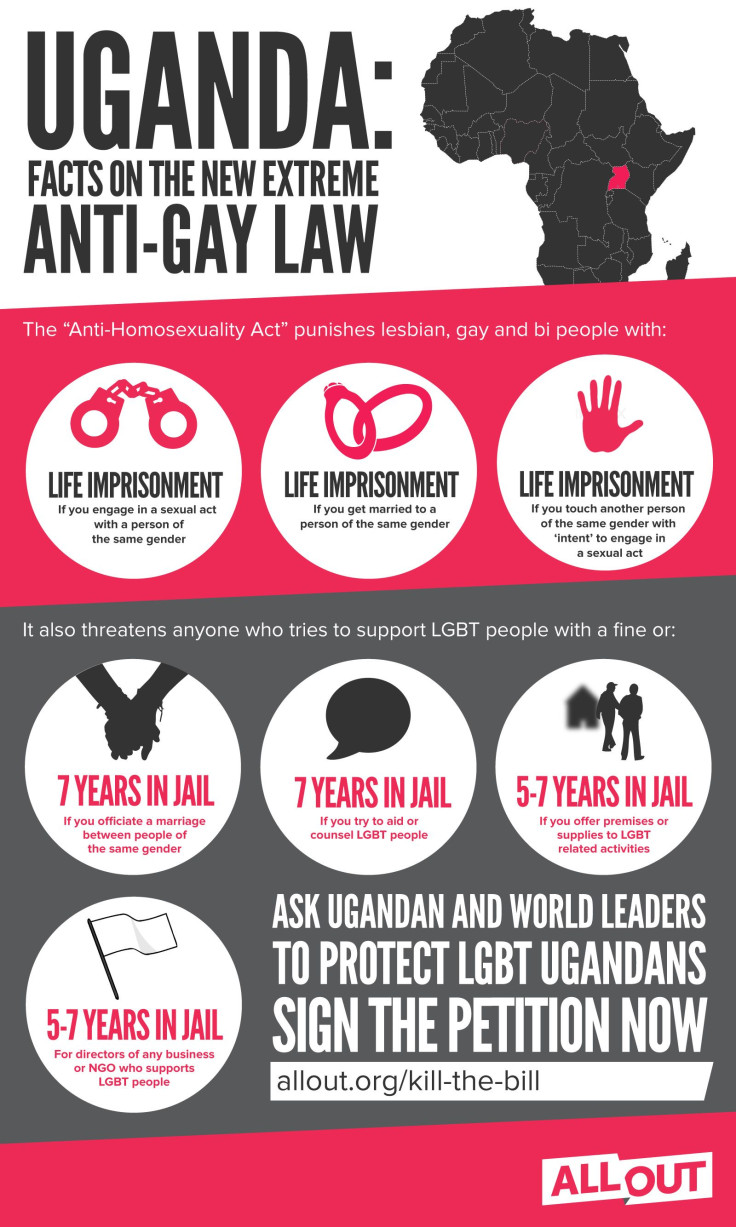What's Next For Uganda's LGBT Community After Anti-Homosexuality Bill Passes?

Ugandan President Yoweri Museveni signed a controversial anti-gay bill into law on Monday, despite pressure from numerous Western nations opposed to Uganada’s efforts to criminalize homosexuality.
The bill, which originally called for the death penalty for homosexual acts when it was first proposed in 2009, toughens penalties against homosexuality, which was already outlawed in Uganda. Since the bill was first introduced in 2009, the United Kingdom and several other European nations have threatened to cut aid to Uganda, which relies on international funding for support. President Obama warned that if Museveni did sign the bill, it “will complicate our valued relationship with Uganda.”
Nevertheless, Museveni went ahead with signing the bill, announcing that he would not bow to Western pressure.
"No study has shown you can be homosexual by nature. That's why I have agreed to sign the bill," Museveni said in a speech at the presidential palace, the Guardian reports.
"Outsiders cannot dictate to us,” he continued. “This is our country. I advise friends from the West not to make this an issue, because if they make it an issue the more they will lose. If the West does not want to work with us because of homosexuals, then we have enough space to ourselves here."
Now that the bill is law, what’s next for Uganda’s already persecuted LGBT community?
Gay people may face life in prison for anyone committing same-sex acts. Even those who “touch another person” with the intention of committing homosexuality can now be sentenced to life in prison. The bill also specifies the more heinous crime of “aggravated homosexuality” – sex acts with those that have HIV, with “repeat offenders” and with minors, Amnesty International reports. Same-sex encounters with an HIV-positive person still carry the penalty of life in prison regardless of whether the sex is protected. Anyone convicted of “aggravated homosexuality” must undergo an HIV test. Ugandans who choose to enter a same-sex marriage are also liable for life in prison.
Uganda’s Anti-Homosexuality bill also increases sentences for attempted same-sex acts. Under the law, anyone who “attempts to commit the offense of homosexuality” is considered guilty of a felony. The charge is very loosely described, and considering that touching another person already carries a sentence of life in prison, this could refer to as little as flirting between two people of the same sex. At the same time, any person who “keeps a house, room, set of rooms, or place of any kind for purposes of homosexuality” can also face seven years in jail.
The bill also criminalizes “promoting” homosexuality, recommending seven years in prison to any individuals offering counseling or other services to gay, lesbian, bisexual and transgender Ugandans.
Human rights groups like Amnesty International have expressed concern that this provision could essentially outlaw much of their work in Uganda, making it extremely difficult to legally advocate for increased gay rights, or even offer adequate health services to LGBT Ugandans. Corporations or other organizations found “promoting homosexuality” can face de-registration in Uganda as well as seven years' imprisonment for the group’s founder.
Read the full text of the law here and see the specifics of the law in the infographic below.

Amnesty International condemned the legislation’s passage as “draconian” and “damaging” soon after it was passed.
“This deeply offensive piece of legislation is an affront to the human rights of all Ugandans and should never have got this far,” Michelle Kagari, Africa deputy director at Amnesty International, said in a statement. “This legislation will institutionalize hatred and discrimination against lesbian, gay, bisexual, transgender and intersex people in Uganda. Its passage into law signals a very grave episode in the nation’s history.”
LGBT rights group All Out has launched a petition urging foreign leaders, religious institutions and corporations working in Uganda to take action against the law. As of press time, it has some 157,00 sponsors, just shy of its goal of 175,000.
“With the stroke of a pen, President Museveni has drawn a target on the backs of Uganda’s gay and lesbian people and opened up every Ugandan citizen to blackmail and false attacks. It’s unconscionable that fair minded people around the world are staying silent while the Ugandan government declares war on its own lesbian, gay, bi and trans citizens, in full contradiction of its own Constitution and past reassurance to the international community,” Andre Banks, executive director and co-founder of All Out, said in a statement.
Uganda’s new laws are extremely harsh, but it is not the only African nation to make homosexuality illegal. According to Amnesty International, 38 of the 54 African nations have placed bans on same-sex relationships.
© Copyright IBTimes 2024. All rights reserved.





















